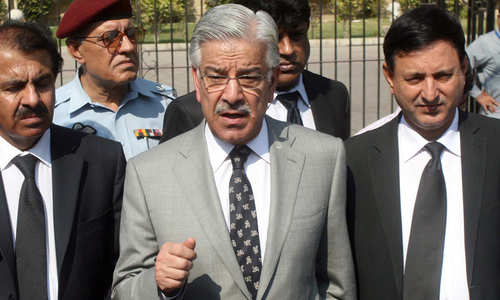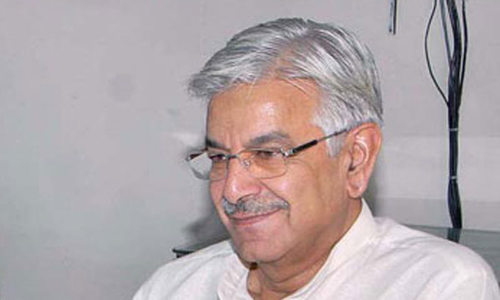ISLAMABAD: In a detailed judgement on a petition of former foreign minister and Pakistan Muslim League-Nawaz leader Khawaja Mohammad Asif against his disqualification on the Islamabad High Court order, the Supreme Court has declared that an elected member cannot be disqualified for life by invoking Article 62(1)(f) of the Constitution unless dishonesty is established in appropriate judicial proceedings.
Attributing dishonesty to every omission to disclose an asset and disqualification of a member for life could never have been the intention of parliament while incorporating Article 62(1)(f) in the Constitution, wrote Justice Faisal Arab in the detailed judgement issued on Friday explaining reasons for setting aside the IHC order on June 1.
The detailed judgement has put a lid on the raging debate that the Panama Papers case had introduced a concept of strict liability and a mere omission may lead to disqualification of an elected member.
Detailed judgement in Khawaja Asif case ends the impression that mere omission is enough to disqualify elected members
The IHC had disqualified Mr Asif on April 26 under Article 62(1)(f) of the Constitution for not disclosing salary drawn from a UAE firm. In his petition, the former minister argued that the IHC by holding him disqualified had taken an exception against an elected parliamentarian especially when no allegation of corruption, fraud, embezzlement, accumulation of wealth, money laundering, misappropriation of public property or public funds or abuse of public authority for private gain had ever been levelled against him.
Justice Arab was part of the three-judge Supreme Court bench, headed by Justice Umar Ata Bandial, which had taken up the petition and set aside the IHC ruling.
The detailed judgement explained that all nondisclosures of assets could not be looked at with the same eye. “In our view, no set formula can be fixed with regard to every omission to list an asset in the nomination paper and make a declaration of dishonesty and impose the penalty of lifetime disqualification,” it contended.
While considering a case of dishonesty in judicial proceedings what should not be lost sight of is that a legitimately acquired asset may not be declared on account of inadvertence or honest omission on part of a contesting candidate. This may happen as an honest person may perceive something to be right about which he may be wrong and such perception cannot necessarily render him dishonest though the omission would invariably result in rejection of his nomination paper if such a fact is pointed out to a returning officer at the time of scrutiny of nomination papers or in proceedings available under the election laws, the judgement explained.
It added that there were many conceivable instances where an omission to declare an asset on the face of it could not be regarded as dishonest concealment. Mere omission to list an asset could not be labelled as dishonesty unless some wrongdoing was associated with its acquisition or retention which was duly established in judicial proceedings, the verdict said.
Even the proviso to Section 14(3)(d) of Representation of Public Act (RoPA) envisaged that rejection of a nomination paper on account of failure to meet the requirements of Section 12 of RoPA would not prevent a candidate to contest election on the basis of another validly filed nomination paper.
Referring to the case of Mr Asif, the judgement explained that his disqualification was sought on the ground that he had AED5,000 in his account maintained with the National Bank of Abu Dhabi, the UAE. That account Mr Asif failed to disclose in his nomination paper filed at the time of contesting the general elections due to oversight, as he had disclosed the same in the statement of assets and liabilities filed in the year 2015 as required under Section 42A of RoPA.
According to the judgement, a complete bank statement of the said account is on the record which reflects that the petitioner opened his account on April 17, 2010 with a sum of AED5,000 and five years later closed it on July 7, 2015. In the present case neither a case of conflict of interests is made out nor has any wrongdoing associated with any asset belonging to him has been established in order to warrant interference in proceedings in the nature of quo warranto.
Published in Dawn, October 20th, 2018















































